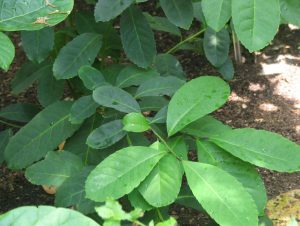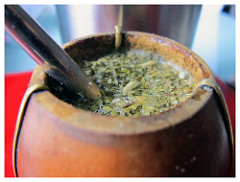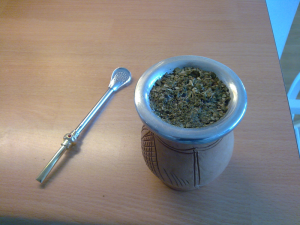Stimulating South American herb yerba mate appears to promote fat loss via multiple mechanisms.

Yerba mate is a herb rich in caffeine and other bio-active compounds. It has been suggested to promote fat loss through:
- Inhibiting adipogenesis, the process which creates new fat cells.
- Promoting thermogenesis, which can result in more body fat being burned.
- Suppressing appetite. Yerba mate has been demonstrated to affect several compounds that control satiety.
Overview

Yerba mate (Ilex paraguariensis) is a herb used to make a traditional beverage consumed throughout South America. Its leaves are typically brewed into mate, a stimulating, caffeine-rich tea.
Yerba mate contains many biologically-active nutrition compounds, including xanthines, minerals, antioxidants, polyphenols, saponins, and amino acids.1
Yerba mate has been demonstrated to have many beneficial properties, including anti-inflammatory, vasodilation (blood-vessel widening) and antioxidant activity, inhibition of atherosclerosis, and improvement of glucose tolerance.
However, it is best known for its purported weight loss benefits, which have been supported by a large number of animal studies, as well as a few human trials.
![By Franz Eugen Köhler, Köhler's Medizinal-Pflanzen (List of Koehler Images) [Public domain], via Wikimedia Commons](https://supplementsinreview.com/wp-content/uploads/2016/09/Ilex_paraguariensis_-_K%C3%B6hler%E2%80%93s_Medizinal-Pflanzen-074.jpg)
How Yerba Mate Might Help With Weight Loss
Because research on the use of yerba mate for weight loss in humans is still in its early stages, most of the evidence for its beneficial bio-activities is restricted to animal studies. These include:
Promoting satiety
One of the ways yerba mate might work is by making you feel less hungry. Studies in overweight mice have shown that yerba mate appears to enhance the action of intestinal glucagon-like peptide-1 (GLP-1) and leptin (popularly known as the “satiety hormone”), two compounds that are known to promote satiety.
Reducing adipogenesis
Adipogenesis is the process which produces fat cells. Yerba mate has been suggested to modulate and ultimately inhibit this process by repressing the gene expression of factors that promote adipogenesis, such as Ppar-γ and C/ebp-α.2
Promoting thermogenesis
In addition to regulating genes that control adipogenesis, yerba mate may also act on genes that control thermogenesis – the body’s production of heat. In particular, its thermogenic activity has been shown to affect metabolism by regulating expression of uncoupling protein (UCP) 2 and UCP 3 genes, and increase mRNA levels of the Pgc1α and UCP 1 genes.3
Yerba Mate’s Fat Burning Benefits
Although yerba mate is mostly used for its stimulating properties, clinical research has shown that it can reduce body fat and aid weight loss. Indeed, findings of both animal and human studies have been overwhelmingly positive, and suggest that it is one of the only herbs that can be useful as a weight loss agent.
In addition, yerba mate may also enhance the fat-burning effects of exercise by increasing the body’s fat oxidation.

Research
Animal Research
Yerba mate has been heavily studied as a weight loss agent in animals. Specific findings indicate that it may:
- Decrease body weight, body mass index (BMI) and food intake in obese mice5
- Reduce body weight gain and related parameters, such as cholesterol, triglycerides, LDL cholesterol, and blood glucose levels in mice fed a high-fat diet6 7
- Promote the feeling of satiety in mice, resulting in lowered food intake8
Human Research
Research on yerba mate’s weight loss effects in humans is relatively scarce, but thus far most findings are positive.
This randomized, double-blind trial tested the purported weight loss benefits of yerba mate. Thirty overweight and obese participants took placebo or yerba mate (3 g capsules) daily for 12 weeks. The yerba mate group saw a decrease in body fat and waist-hip ratio (WHR) compared to placebo.
- The researchers concluded that “Yerba Mate supplementation decreased body fat mass, percent body fat and WHR. Yerba Mate was a potent anti-obesity reagent that did not produce significant adverse effects“9
In this study, a group of volunteers were supplemented with 12 different plant preparations suggested to have anti-obesity action. Only yerba mate extract was shown to have a useful effect, causing a significant increase in fat oxidation (the usage of fat for energy).
- The researchers concluded that “Poor potential of these plant preparations in the treatment of obesity, except possibly for the maté extract. Further studies are required to explore the influence of higher dosages of these preparations as well as chronic administration in man.“10

Yerba mate. Image by Oskar & Josefin licensed under CC by 2.0
This randomized, double-blind, crossover study examined the effect of yerba mate on fat oxidation during exercise. Fourteen people were given yerba mate capsules (1000 mg) or placebo 60 minutes before performing exercise on a stationary bycicle.
Yerba mate was found to increase fatty acid oxidation (FAO) and energy expenditure derived from FAO during exercise by 24% at submaximal exercise intensities, which could increase fat loss achieved from exercise.
- The researchers concluded that “Acute YM ingestion augments the exercise dependent increase in FAO and EEFAO at submaximal exercise intensities… suggesting a potential role for YM ingestion to increase the exercise effectiveness for weight loss and sports performance“11
Dosage for Fat Burning
- Yerba mate leaves can be used in dried, powder, extract, capsule or tablet products
- In powdered form, 1000 – 1500 mg daily is recommended
- If taken as tea, a dose of 3 cups (330 ml per cup) daily is suggested for weight loss
- Keep in mind Yerba mate may be in blended herbal tea products, sometimes combined with ginger, green tea or other fat burners









0 comments:
Post a Comment
I'd love to hear your comments, do share your thoughts with me...